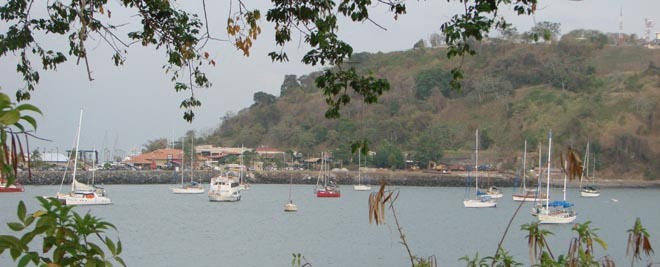Sail-World's Blackwattle - Where Where the Wind...
by Nancy Knudsen on 18 Apr 2007

Blackwattle at anchor in La Playita Amador BW Media
After four years away, we're in our home ocean at last. Mmmm, well... it doesn't feel much like home – the ocean is flat, the pelicans are brown, the beer costs 30cents a can and everyone around me is talking Spanish.
The anchorage here at La Playita Amador has been pleasant. We've been invited onto Al Capone's yacht, still graceful, but used now mostly for tourist trips. In the beautiful polished timbers inside we can imagine him entertaining his buddies and member of Congress. Ted takes the wheel, getting the feel of being a mafia magnate.
We've enjoyed the Smithsonian Research Facility beside it on Punta Culebra too – a fascinating walk through this wired off island point used by the Smithsonian Institute for researching the flora and fauna of the tropics. We enjoy the crab habitats, lizards, shells, tropical fish and sea turtles all existing amazingly in this unique life cell, unaware they are in the middle of a city of 1.5 million souls. But it's time to GO.
Getting a boat ready for a long sea voyage into remote places is a nail-biting affair. What if the navigation computer fails? (so we buy another one quickly) Do we have enough spares – for electronics, mechanics, snatch blocks, cabin globes, lures for all the fish we are to catch? Will the vegemite last? Lollies for the island children? Check the red wine! My sailing gloves have a hole! How's the medical chest – short of anything? It goes on and on interminably, and then finally you get to the provisioning.
So the boat has again sunk to an all time low, and we could probably feed a starving group of teenagers for six months! We've bleached the fresh fruit and vegetables, wrapped a hundred citrus fruit individually in aluminium foil, stowed it all in impossible to remember places, and we're away!
Of course, we're not going far – the ITCZ(Doldrums) is still hovering over Panama, and we are hoping to wait until it goes north so that we don't have to motor 900 miles to Galapagos. We're headed for Las Perlas, just 35 miles away, to wait.....
It's a floppy listless sea as we motor out from Panama City. The air is thick and sweaty, the sky is a forlorn mess of gray stains and dirty whites, like some of Ted's favourite shirts.
But now this alien world of bland water and sky is becoming unexpectedly electric with life. There are marlin jumping straight and high from the water, each time falling with a dramatic splash. There are other nameless fish splashes too - life and death struggles in the food chain. Dolphins galore, soaring and swooping below the boat, dozens of slippery bodies - here, there, you have to look quickly - appearing for an just for an arcing instant.
Soon we are surrounded by thousands of pelicans all around us – flapping lazily close to the water in long even lines, tribes or families maybe. We gaze, fascinated with the strength in their shoulders and their easy precision flying. Still others are migrating northwards, and the difference is immediately obvious – those migrating are flying high above us, much longer lines and rather than the straight lines, they are moving in the long traditional V's associated with migrating birds – up to 100 at a time.
We also happen on some kind of pelican meeting – hundreds of birds sitting collected together on the water and flapping around a bit - maybe a pelican parliamentary session – Everyone is talking and no-one seems to be listening; some of the pelicans are involved in heated discussions with each other, probably about not very much; some keep dashing off somewhere that's obviously more important and then coming back - and others actually seem to be asleep. Yes, quite similar to a human parliament when you think about it.
We enjoy these dark brown/grey birds, which are so so prolific here now, and whom we know to have been endangered during the 1900's. It's an irony – DDT, which aided so much the construction of the Panama Canal by eradicating the malaria mosquito that brought death to tens of thousands of workers, also almost caused the destruction of this fine bird species. After the banning of DDT, they have continually multiplied, and it's a delight to see such vast numbers flying wide and high across all these coastal waters of Panama.
On first sight, this Pacific Ocean, which is so irritatingly PACIFIC today, is vastly more alive than the Atlantic ever was for us. With delight Ted catches our first fish for years, and we are both so excited I forget to take a picture! Well, it was just a small bonito, but the expression on Ted's face would have been worth a photo. So we motorsail to Isla Contadora, an attractive island ringed with sumptuous villas along its high and undulating shores.
It's pretty but nothing spectacular, though the water is fresh and clean and it's so good to be away from the city.
Waiting..waiting.. Will we ever get the wind?
If you want to link to this article then please use this URL: www.sail-world.com/32695